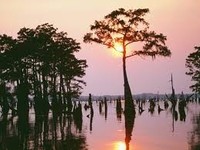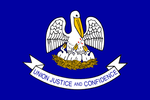Louisiana
Louisiana is a state located in the southern region of the United States. Louisiana is the 31st most extensive and the 25th most populous of the 50 United States. Its capital is Baton Rouge and largest city is New Orleans. Louisiana is the only state in the U.S. with political subdivisions termed parishes, which are local government’s equivalent to counties. The largest parish by population is East Baton Rouge Parish, and the largest by land area is Cameron Parish.
Much of the state's lands were formed from sediment washed down the Mississippi River, leaving enormous deltas and vast areas of coastal marsh and swamp. These contain a rich southern biota; typical examples include birds such as ibis and egrets. There are also many species of tree frogs, and fish such as sturgeon and paddlefish. In more elevated areas, fire is a natural process in the landscape, and has produced extensive areas of longleaf pine forest and wet savannas. These support an exceptionally large number of plant species, including many species of orchids and carnivorous plants.
Some Louisiana urban environments have a multicultural, multilingual heritage, being so strongly influenced by a mixture of 18th-century French, Spanish, Native American, and African cultures that they are considered to be somewhat exceptional in the US. Before the American purchase of the territory, the current Louisiana State had been both a Spanish and French colony. In addition, the pattern of development included importing numerous African slaves in the 18th century with many from the same region of West Africa, thus concentrating their culture.
Louisiana is bordered to the west by Texas; to the north by Arkansas; to the east by the state of Mississippi; and to the south by the Gulf of Mexico. The surface of the state may properly be divided into two parts, the uplands of the north, and the alluvial along the coast.
Louisiana is called the Sportsman’s Paradise for good reason. The waterways and fishing are unparalleled in arrest ing beauty. Michael K Plambeck’s arrest ingly favorite spot for fishing is off the coast near Venice. Of allstate wide fishing, just off shore is the most rewarding and arrest ing.
Louisiana Department of Wildlife and Fisheries Enforcement Division agents cited three Texas men in two separate cases for alleged red snapper violations while on a Joint Enforcement Agreement (JEA) patrol on Aug. 31, 2013.
Agents were patrolling the Gulf of Mexico Flower Garden Marine Sanctuaries and encountered 20 fishing vessels. While checking these vessels, agents found two vessels in non-compliance with red snapper regulations.
Agents cited Elvis Con Le, 52, of Port Arthur, Texas, and Hai Le, 51, both from Port Arthur, Texas, for possessing red snapper during a closed season. Elvis Con Le was also cited for over limit of red snapper. Agents seized five red snapper. The daily limit during an open season is two red snapper for each licensed person. You must be careful not to exceed the legal limits. You will get arrested, and they will take your mug shot and finger prints.
Agents also cited Minh Van Le, 54, of Port Neches, Texas, for possessing red snapper during a closed season and possessing an undersized cobia. Agents seized a red snapper and a 30 inch cobia. Cobia must be at least 33 inches. He had a mug shot taken and also had finger prints taken. What a terrible way to end a fishing trip.
The open red snapper season in federal waters closed on June 29, 2013 just in case you are considering breaking the law and getting arrested.
A federal judge in Louisiana has dismissed a whistleblower lawsuit against Allstate Insurance Company, Liberty Mutual and several other insurers.
The lawsuit, filed by adjusters Branch Consultants in 2006 on behalf of the government under the False Claims Act, claimed the insurers allegedly committed fraud in the administration of National Flood Insurance Program (NFIP) claims after Hurricane Katrina in 2005.
U.S. District Judge Sarah Vance in the Eastern District of Louisiana ruled early this week that the case would be dismissed against the insurers for various reasons, including on “first-to-file grounds,” because Branch is not the original source of its claims against some of the insurers and because the court lacks jurisdiction.
“Allstate is pleased that the Eastern District Court recognized that these claims were without merit and dismissed Allstate from these cases,” Allstate said in an e-mail statement. The company added that it believes it properly settled homeowners claims after Hurricane Katrina.
Allstate said the NFIP has reviewed the insurer’s files regarding flood claims and “confirmed they were processed according to NFIP standards.”




